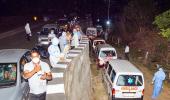Amid the growing queues of ambulances waiting for patients to be admitted with ventilators and oxygen, only time will tell if the state government has lost the plot or not, reports Vinay Umarji.

With the intensifying second wave creating a rush to procure the anti-viral drug Remdesivir, a leading Gujarati daily, Divya Bhaskar, recently made news by printing Bharatiya Janata Party state chief C R Paatil's mobile number on its front page.
The move was in response to the controversy sparked by Paatil, who claimed he had procured 5,000 Remdesivir injections in Surat though he had refused to divulge the source. Gujarat Chief Minister Vijay Rupani later evaded the question, maintaining that he wasn't aware how Paatil had procured the drug.
The second wave has brought the state under scanner, with the much touted 'Gujarat model' now in focus.
To make matters worse, Gujarat high court Chief Justice Vikram Nath and Justice Bhargav Karia took the state government to task over the controversy, citing media reports. In defence, Advocate General Kamal Trivedi submitted that the attempt by Paatil was to do charity out of 'sheer enthusiasm'.
'This was not with an intention to create any malice; the idea was to see that people are helped out,' Trivedi submitted.
Similar to a suo motu public interest litigation heard by the high court last year, the bench recently heard Advocate General Trivedi's submissions during a suo motu PIL over a health emergency in the state, and directed measures to contain the same.
In two separate hearings over a week, the bench not only pulled up the government for the apparent mismanagement, but also gave specific directions.
For instance, it suggested steps such as putting a cap on the number of guests at weddings to 50, limiting people attending funerals, and banning other gatherings.
Earlier, the court had suggested a shorter lockdown, such as during weekends, to which Trivedi submitted that the lockdown in 2020 had resulted in an 'ocean of misery among poor and migrant workers'.
As of mid-April, Gujarat had crossed 5,000 deaths since the pandemic first hit. The clogged health infrastructure, in terms of bed occupancies, has been alarming.
In Ahmedabad alone, 96 per cent of the 5,817 beds are occupied, including 98 per cent occupancy in intensive care unit beds and 99 per cent in ventilators.
The state had also been asked to ease the common man's long wait for RT-PCR tests and results, a situation yet to ease.
During the hearing of the suo motu PIL, the Bench also pulled up the state government over shortage of Remdesivir injections, and ordered it to make the stock available for all.
The court rejected the state's arguments on the drug's shortage and that doctors were prescribing them indiscriminately.
The bench also reminded the government of its earlier order passed in the suo motu petition filed last year, in which it had anticipated a surge in cases as seen in Western countries, and had directed the state to stay prepared with adequate Covid hospitals, beds, and testing facilities.
Further, the court expressed doubts regarding the government's claims on availability of Covid beds across hospitals. While Trivedi submitted that there was 53 per cent occupancy for the 71,021 beds across Gujarat, the bench raised 'serious doubts on this figure'.
On the testing front too, the court directed the state to ramp up the same and create permanent RT-PCR and CT scan facilities in smaller districts. The bench insisted the government promote entrepreneurs by extending loans to establish laboratories with RT-PCR testing facilities, which require Rs 25 lakh-Rs 30 lakh (Rs 2.5 million to Rs 3 million).
Observers believe the roots of the current mismanagement go back to the BJP's move to communalise and corporatise the administration in its state government. Compared to the Congress's way of dealing with similar crises such as natural calamities in Gujarat, political analyst Gaurang Jani says the BJP has historically not been adept at the same.
"The Congress has had a strong history of dealing successfully with natural calamities. Whereas, during the BJP's reign, the 2001 earthquake was largely supported by international and domestic NGOs and philanthropic organisations, while Keshubhai Patel had to quit as CM amid allegations of mismanagement of relief work," says Jani.
"Ironically, over the years, the BJP governments at both the Centre and state have worked towards stifling several international and domestic NGOs that were adept at handling such crises," adds Jani.
On its part, the state government immediately began announcing measures such as permission to operate with only 50 per cent staff in public and private offices, as well as the addition of over 5,000 beds across cities.
In addition to a drive-through testing facility with 10 stations, a 900-bed makeshift Covid hospital is being developed in collaboration with DRDO in Ahmedabad.
However, amid the growing queues of ambulances waiting for patients to be admitted with ventilators and oxygen, only time will tell if the state government has lost the plot or not.











